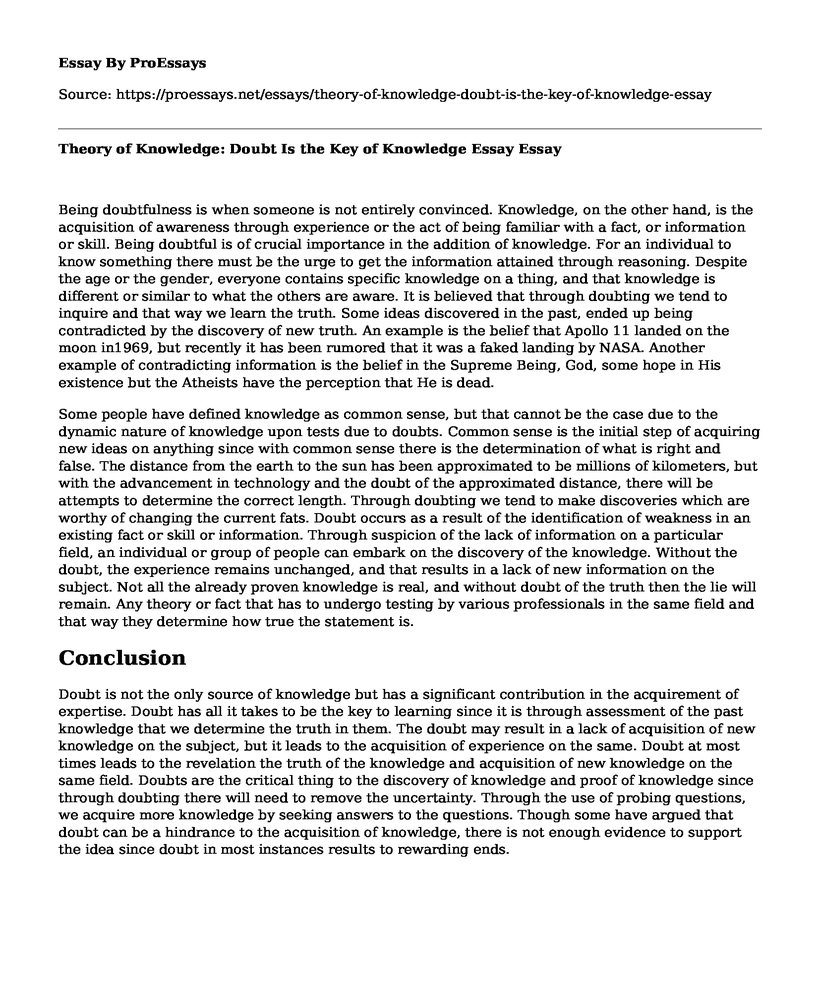Being doubtfulness is when someone is not entirely convinced. Knowledge, on the other hand, is the acquisition of awareness through experience or the act of being familiar with a fact, or information or skill. Being doubtful is of crucial importance in the addition of knowledge. For an individual to know something there must be the urge to get the information attained through reasoning. Despite the age or the gender, everyone contains specific knowledge on a thing, and that knowledge is different or similar to what the others are aware. It is believed that through doubting we tend to inquire and that way we learn the truth. Some ideas discovered in the past, ended up being contradicted by the discovery of new truth. An example is the belief that Apollo 11 landed on the moon in1969, but recently it has been rumored that it was a faked landing by NASA. Another example of contradicting information is the belief in the Supreme Being, God, some hope in His existence but the Atheists have the perception that He is dead.
Some people have defined knowledge as common sense, but that cannot be the case due to the dynamic nature of knowledge upon tests due to doubts. Common sense is the initial step of acquiring new ideas on anything since with common sense there is the determination of what is right and false. The distance from the earth to the sun has been approximated to be millions of kilometers, but with the advancement in technology and the doubt of the approximated distance, there will be attempts to determine the correct length. Through doubting we tend to make discoveries which are worthy of changing the current fats. Doubt occurs as a result of the identification of weakness in an existing fact or skill or information. Through suspicion of the lack of information on a particular field, an individual or group of people can embark on the discovery of the knowledge. Without the doubt, the experience remains unchanged, and that results in a lack of new information on the subject. Not all the already proven knowledge is real, and without doubt of the truth then the lie will remain. Any theory or fact that has to undergo testing by various professionals in the same field and that way they determine how true the statement is.
Conclusion
Doubt is not the only source of knowledge but has a significant contribution in the acquirement of expertise. Doubt has all it takes to be the key to learning since it is through assessment of the past knowledge that we determine the truth in them. The doubt may result in a lack of acquisition of new knowledge on the subject, but it leads to the acquisition of experience on the same. Doubt at most times leads to the revelation the truth of the knowledge and acquisition of new knowledge on the same field. Doubts are the critical thing to the discovery of knowledge and proof of knowledge since through doubting there will need to remove the uncertainty. Through the use of probing questions, we acquire more knowledge by seeking answers to the questions. Though some have argued that doubt can be a hindrance to the acquisition of knowledge, there is not enough evidence to support the idea since doubt in most instances results to rewarding ends.
Cite this page
Theory of Knowledge: Doubt Is the Key of Knowledge Essay. (2022, Sep 26). Retrieved from https://proessays.net/essays/theory-of-knowledge-doubt-is-the-key-of-knowledge-essay
If you are the original author of this essay and no longer wish to have it published on the ProEssays website, please click below to request its removal:
- Should College Football Athletes Be Paid?
- Provision of OHIP the Psychologists Dealing With the Mentally Ill Paper Example
- Positive School Culture - Essay Sample
- Impact of Media on Mental Health - Essay Sample
- Essay Sample on Unlock Your Boundaries: The Future of Career Success
- Essay Sample on Love and Hatred: Significant Factors in an Individual's Life
- Parents of ASC Pupils: Supported by School Staff in EHCP Reviews - Essay Sample







